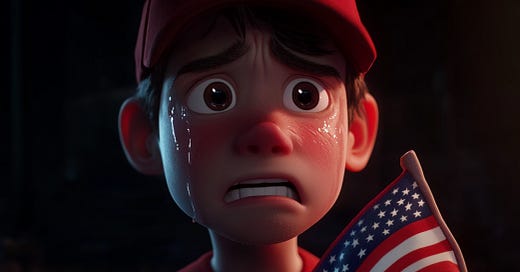On the night of November 5, 2002, I walked outside, dropped to my knees, and started crying.
The state senate race for which I had been a co-campaign manager was just officially called. But I wasn’t weeping because my candidate had lost, I was doing so because she had won.
For nearly half a year, I had poured every ounce of my strength and attention into the campaign, from fundraising to filming television ads to hammering signs into lawns. I had been sleeping under desks in the campaign office and crashing on couches all over town, hours away from my home. At the time, my wife and I were trying to conceive a child, and I often missed the windows to do so because I had to be at a debate or a fundraiser. (We finally succeeded in December, a month after the campaign ended.)
But I did it because I loved it. As an ex-jock, I craved the competition I once found in sports, and what is an election other than a game played on a single day after months of preparation? It is hard to match the dopamine rush of being personally involved in a race - it’s like bungee jumping if the fall took six months.
But a strange thing has happened in the past two decades: voters are now as emotionally invested in the outcome of races as the people running them. In the way I found entertainment in orchestrating individual races, people now find the adrenaline rush watching people hammer each other for months on end.
For too many people, politics has become their religion, their daily entertainment, and their personal identity all wrapped up in one. With candidates claiming they will better every corner of American life and claiming their opponent will destroy the nation, each race becomes a blood sport, with supporters cheering the carnage on as if they were at a cockfight.
But one thing age has taught me is that politics cannot possibly make you happy. Even if your candidate wins, you’re just going to crave that same dopamine hit two years later when the next slate of elections rolls around. And sometimes, your candidate is going to lose, and if you believe the fate of society rests on that race, it will send you into a deep depression.
Further, even if they win, candidates will always disappoint you. Campaign promises almost always dissipate into the atmosphere like cigar smoke. Promising to end Obamacare, to build a wall on the U.S.-Mexico border, to deport millions of illegal immigrants quickly, and to eliminate the U.S. debt all fade away, making room for new promises that will be immediately broken upon re-election.
But in the decades since I stopped running races, one thing has become clear: Hardly any of it actually matters. When you’re working in politics, you have to believe that voter by voter, district by district, what you’re doing will fundamentally transform America into something that approximates your vision.
But age teaches you something very different. If you hold a position you think is perfectly rational, at least half of Americans will hold the opposite position. While you think you are just around the corner from your ideology dominating American thought, it will never happen. The most you can ask for is to maybe hold one or two houses of Congress, and even then, you need a filibuster-proof majority in the Senate for your ideals to rule the day.
So while visions of a fully conservative or progressive society dance in the heads of citizens on each side, it is never going to happen. The America that saw Ronald Reagan win 49 of 50 states in 1984 is never returning. There is simply too much money to be made starting organizations meant to scare people into voting for or against candidates; the out-of-office party will always be funded in a way it never had been in the past.
And, of course, politics will always disappoint you because politicians are people. You can spend decades fighting for lower taxes or less business regulation or a more sane immigration policy, but the very same politicians who said they want the same things you do will completely flip their positions when threatened by a popular newcomer in their own party.
Once again, take the issue of immigration, which Republicans have been using for years now to hammer Democrats for supporting “open borders.” But when given the chance to fund more border police and stiffer entrance policies, congressional Republicans killed the bill because they needed Donald Trump to be able to hammer incumbent President Joe Biden for being too weak on border policy.
In other words, if you support a policy you think will make America great, your own side will work against your preferences if they think it will help its opponents. After all, you can’t Make America Great Again if it actually improved with another party at the helm.
All this has happened because all politics is now entertainment. It is owning the other side. And once one side takes a small lead, the other side redoubles their efforts to cut them down.
We elected an entertainer as president and treat him like a celebrity when he gets into trouble. When Donald Trump says something that would have ended the career of any other politician, Americans wave it off as if he was a movie star or a famous musician. That is because Trump’s fans are constantly entertained by him and, like fans of a boy band or Taylor Swift, take any criticism of him personally.
But it is this culture of politics as entertainment that ends up with an insult comic performing at a political rally, calling Puerto Rico - an American territory - a “floating island of garbage” in the middle of the ocean. The Trump campaign has disavowed the jokes made by comedian Tony Hinchliffe at their New York rally last week, but there is a reason those types of caustic jokes are made at Trump rallies and nowhere else. Because the entertainment wing of politics now includes insult comics that make fun of, for example, black people carving watermelons for Halloween instead of pumpkins.
American government is now built like a kangaroo, in which the rump end is much stronger than the brain. Politics and campaigns used to be the means to power, where elected officials could get things done. But now politics is the power, used to belittle and demean opponents on the way to an office one can use solely to belittle and demean more opponents.
And now everyone treats races as if they are the ones intimately involved in ensuring whether their candidate emerges victorious. As with my former days as a campaign hack, we should all cry no matter who wins or loses.
The Two-Chance Rule
As I write this, America is embroiled in its latest stupid controversy - whether President Joe Biden called Donald Trump’s supporters “garbage.”
This, of course, stems from the statements made by Tony Hinchcliffe at last weekend’s New York City Trump rally (see above.) Biden responded to the joke that Puerto Rico was a “floating island of garbage” by saying “The only garbage I see floating out there is his supporters.”
Or did he? Biden’s people are now claiming there was a silent apostrophe in the word “supporters,” making it “supporter’s,” meaning Hinchliffe alone, or “supporters,’” relating to a number of Trump fans.
Either way, Trump’s fans are flopping like a Colombian soccer player, claiming this grievous injury shows Biden hates half of America.
A sane world would apply the “two-chance rule.” When someone says something, they get one chance to clean it up and set the record straight about what they meant. We all say stupid things we don’t mean - especially those of us that go on television from time to time. Your tongue gets twisted, your brain freezes, and you blurt out something that doesn’t make any sense.
Everyone should get at least one chance to correct the record and change what they said upon second thought. If the idea is to suss out what someone really thinks, give them an extra chance to say what they really think.
If a politician keeps saying the same thing over and over, then sure - that is their official position and it is worth criticizing. But nobody actually believes Biden thinks all Trump supporters are “garbage,” even if he might be disappointed by them. His clarification should be enough. (And trust me, this rule would be needed to clean up Trump statements far more often than it would be needed for Biden to set the record straight.)
As long as we are on the topic, it is worth noting that Biden has long been known as a gaffe machine. In the 2008 election-year season of Saturday Night Live, the show did a full sketch in which then-VP candidate Biden (played by Jason Sudeikis) rambles through gaffes that would hurt the then-presidential candidate, Barack Obama. And here were are, 16 years later, and Biden is still damaging black candidates who he is actually trying to help.
ALSO:
Speaking of Saturday Night Live, our podcast, Wasn’t That Special, has rolled on, and we just issued the Season 34 (2008-09) episode. For those looking for a free episode to listen to, we also did a quick one reviewing the new Saturday Night Movie, which Scot and I both liked, even if the timeline is a bit off.
You can listen here:
ALSO:
I recently took a trip to France and England, where I saw the typical touristy sites, took my dad on a helicopter tour of the Normandy D-Day beaches, and visited the home of my beloved Tottenham Hotspur soccer team:
While galavanting around Europe, I listened to the new album by the punk band Bad Nerves almost nonstop. Here’s “You’ve Got the Nerve.”
Subscribe and tell a friend!








